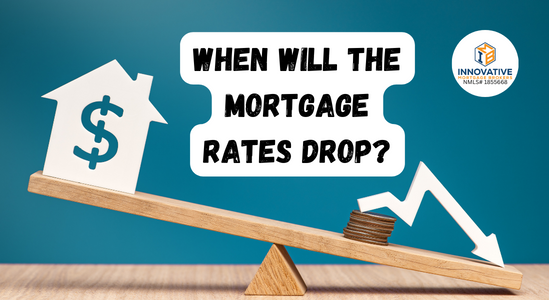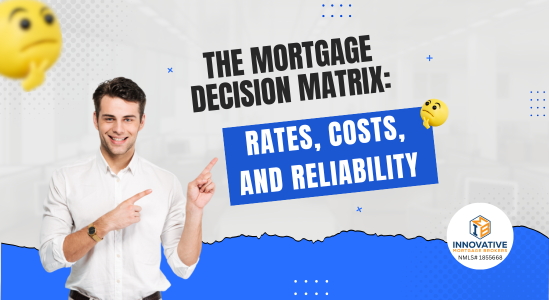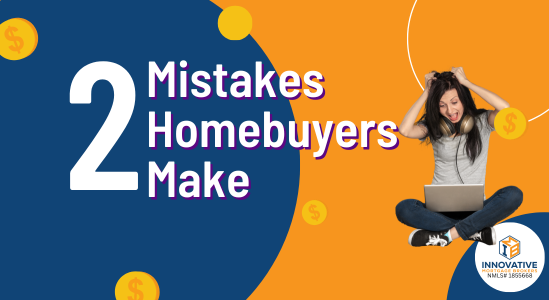Embarking on the journey to homeownership can often feel like navigating a labyrinth, with mortgage…
Top 7 Common Mortgage Myths Debunked
As a mortgage broker, we’ve heard it all when it comes to mortgage misconceptions. From outdated assumptions to outright myths, these misconceptions can prevent potential homeowners from taking the first step towards fulfilling their dream of homeownership. That’s why we want to set the record straight on 7 of the most common mortgage misconceptions, debunking each one in turn.
You need a perfect credit score to get a mortgage.
A common myth about mortgages is that you need a perfect credit score to get approved. While having a good credit score is certainly an important factor in mortgage approval, it is not the only factor. Many lenders offer mortgage products for borrowers with credit scores as low as 580.
Having a higher credit score can make it easier to get approved for a mortgage and may qualify you for lower interest rates, lenders all have their own credit score requirements. Some lenders may require a minimum credit score of 620, while others may offer mortgage products for borrowers with scores as low as 580. That’s why it’s essential to do your research and shop around for lenders that offer mortgages suited to your individual needs.
If you’re worried that your credit score will prevent you from getting approved for a mortgage or that you’ll get stuck with high-interest rates, there are steps you can take to improve your credit score before applying. Paying down debt, making on-time payments, and disputing any errors on your credit report are just a few strategies that can help boost your score.
You need a large down payment to get a mortgage.
One of the most significant hurdles that homebuyers face is coming up with a large down payment. However, one of the biggest misconceptions surrounding mortgages is that you need to put down 20% of the purchase price of the home as a down payment to get approved for a mortgage. In reality, there are many mortgage options available with a lower down payment requirement. So, if you’re holding off on buying a home because you think you need to save up a large down payment, let’s debunk this myth and show you your options.
While putting down a larger down payment can lower your monthly mortgage payment and give you more equity in your home, it’s not always necessary. Some lenders offer mortgage programs with as little as 3% down payment for qualified borrowers.
If you’re deciding between a lower down payment and a lower interest rate, it is important to know that having a larger down payment can make it easy to secure a lower interest rate because it shows more skin in the game to the lender. However, that doesn’t mean that you should wait to build up your savings. Many borrowers can still qualify for a good rate with a lower down payment if they have strong credit, assets, and income.
You can’t get a mortgage with a low income.
While having a higher income can make it easier to get approved for a mortgage, it’s not impossible to get a mortgage with a lower income. Lenders will look at factors like your debt-to-income ratio (DTI), which is a measure of how much debt you have compared to your income. Ideally, your DTI should be below 43% to qualify for most mortgages.
There are many mortgage programs available for borrowers with low to moderate incomes that are designed to make homeownership more accessible. One such program is the Federal Housing Authority (FHA) loan, which offers a low-down payment requirement and has less stringent credit score requirements than conventional loans.
It’s cheaper to get a mortgage from a bank.
When you’re in the market for a home loan, it pays to know your options. Most people assume that they need to go directly to their lender or bank when applying for a mortgage. However, many borrowers don’t realize that there is an alternative option – working with a mortgage broker instead. Here’s what you need to know about the benefits of choosing a mortgage broker over a direct lender.
Going directly through your bank may seem like the simplest way to get financing for your home. However, it comes with the downside of limiting your options and competition. Working with a good reputable mortgage broker can provide you the benefit of being able to shop around more easily and quickly compare different lenders, rates, loan products and fees all in one place. By using a mortgage broker, you also get access to multiple banks and lenders which could potentially lead to finding better terms on your loan than if you went directly through just one lender.
A good knowledgeable mortgage broker can also provide expertise and guidance when it comes time to select from among all the types of mortgages available. They are familiar with various regulations and eligibility requirements needed throughout the entire home buying process including appraisals, verifications, as well as how different laws may affect things like refinancing capabilities. Mortgage brokers can answer any questions you may have about credit scores or debt-to-income ratios as well as helping find ways to make sure you’re getting the best deal possible on your mortgage.
Using a mortgage broker simplifies parts of the process by having them take care of much of the paperwork involved in obtaining financing such as ordering appraisal reports or requesting verification documents from other lenders. Additionally, brokers can often help speed up closing time by having better connections within their network which means fewer delays due to things like incomplete documentation or incorrect information being sent back and forth between parties. The process becomes smoother and easier when it’s managed by someone who knows exactly what needs to be done for each step along the way.
In conclusion, using a mortgage broker instead of going directly through your bank offers many advantages that include easier shopping around for competitive deals on loans as well as expert advice throughout every step in the home buying journey plus streamlining paperwork so that everything goes more smoothly from start to finish. Consider working with a broker today if you want an extra layer of support while making sure you’re getting the best possible deal on your mortgage loan!
Mortgage rates are set in stone.
Mortgage rates change daily and this is something that everyone should know when entering into a home loan agreement. Rates can be impacted by both the macroeconomy as well as individual factors such as credit scores and loan terms so it’s important for borrowers to understand how these factors may affect their interest rate over time.
It’s important to take into consideration all of the different factors that could potentially cause mortgage rate movements, including but not limited to: Federal Reserve policy changes, federal budget deficits/surpluses, treasuries yields, industry competition among lenders and overall economic trends. All of these have an impact on the cost of borrowing money so it pays off to pay attention when they adjust. Generally speaking, any news or reports related to macroeconomics will likely have some effect on mortgage rate movements as well – this includes everything from jobless claims numbers to gross domestic product (GDP) data.
The biggest benefit associated with rate fluctuations is the opportunity for borrowers to “lock-in” or secure lower rates if they act quickly during periods where mortgage rates are decreasing due to favorable market conditions. On the flip side, however, it also means that borrowers should be mindful of rising mortgage rates during times when markets don’t favor lower interest costs such as after Fed meetings or when economic data is indicating signs of weakening growth potential within a given area — in this case it may be best for someone looking for financing options wait until a later date before applying for their loan in order to get better terms over time.
Paying off your mortgage early is always the best strategy.
Paying off your mortgage quickly is something many homeowners strive for but this may not always be the smartest financial decision. It’s important to understand the tradeoffs that come with paying off a mortgage early so you can decide whether this route is right for you or not. Here’s what you need to know before making a decision either way.
One of the main drawbacks of paying off your mortgage quickly is that you might miss out on better investment opportunities elsewhere by tying up money in your home loan. By investing money into stocks, real estate, or other investments, you could potentially make more money than what you would have saved by paying off your mortgage faster as these tend to have higher returns over time when compared to the return from prepaying your principal balance on a fixed-rate loan. So if you have extra capital and are considering paying down your mortgage faster, it’s important to consider whether it makes sense for you in terms of potential earnings from other investments instead.
Another benefit could be associated with keeping a mortgage balance is that interest paid on mortgages (up to $750,000) might be deductible when filing taxes each year so this could provide additional savings through tax credits or refunds depending on an individual’s financial situation and where they live. Depending on how much one pays in taxes each year, this could end up being more beneficial over time since they wouldn’t lose out on any deductions they would’ve received in lieu of prepaying their home loan obligation instead.
Ultimately, it all comes down to personal preference – if someone has extra cash flow and wants to take advantage of lower interest rates over time then prepaying their loan balance may make sense; however, there are many factors to consider before deciding which direction is best suited for one’s finances and goals including evaluating current tax brackets as well as opportunity cost associated with investing rather than prepaying debt obligation directly. Do ample research and know all factors involved before making any decisions either direction!
Mortgages come with hidden fees and costs.
When it comes to mortgages, it’s important to shop around to get the best deal. With so many options on the market, it can be overwhelming not knowing which one is right for you. That’s why at Innovative Mortgage Brokers, we have become a popular option for finding great deals with no hidden fees or added costs. Here’s what you need to know about using Innovative Mortgage Brokers if you are looking for a mortgage in Pennsylvania (PA) or Florida (FL) and why it makes financial sense.
One of the biggest benefits of using our services is that you don’t have to worry about any hidden fees or additional charges. All the costs involved in getting a loan are laid out upfront and clearly explained by your loan officer so there are no surprises down the line when you go to the closing table. This makes budgeting much easier as everything is laid out clearly from the beginning and there is no risk of extra charges that were not discussed at first.
Another reason why Innovative Mortgage Brokers are becoming increasingly popular is because we offer a transparent process throughout every step of the loan process. From application to closing, all information regarding fees, interest rates and payment plans are provided in an easy-to-understand format so that borrowers can easily compare their options and make informed decisions based on their individual needs and circumstances.
On top of this transparency, another major draw for many people looking for home financing options is that we provide expert advice and guidance on all aspects of buying or refinancing a home – from pre-qualification counseling to helping negotiate better terms with lenders. We help to guide individuals in making smart financial decisions when looking into new mortgage loans or refinancing programs available in today’s market.
Don’t let these common mortgage misconceptions prevent you from pursuing your dream of homeownership. We use modern technology and tools to streamline the loan process, making it easier and faster for borrowers to get approved and close on their loans. This translates into fewer time-consuming steps throughout the process and more time saved overall, which can make all the difference when trying to lock in lower rates or beat out other offers on homes they’re interested in buying.





